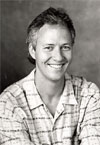by John Biewen
I was in the midst of scripting and editing Cold War Turns Hot this spring when I came across something in my morning newspaper that made me shake my head in wonder, then nod in sad recognition. A letter to the editor in the New York Times complained about the paper's Memorial Day editorial of a few days earlier, which I had not read. In an essay reminding readers about the importance of this annual "time for remembering," the editorial writer had, himself, somehow managed to forget. He forgot Korea, that is. In listing the wars within living memory and their veterans, the Times editorialist cited World War I and World War II, then skipped blithely to Vietnam and Iraq. In the process the writer neglected the 1.8 million Americans who went to Korea from 1950 to 1953 and the almost 37,000 of them who didn't make it home.
It's an oversight I might easily have committed before working on this documentary. I was born too late to remember Korea, and like most Americans I grew up learning next to nothing about it. It simply didn't register as one of the big, important wars of the last century. Having now immersed myself in learning the story of Korea, I'm ashamed of how little I knew before. In fact, I can't remember what I knew; it seems to be very close to nothing. Once you have your consciousness raised about the Korean War, you notice over and over again the depth of the nation's ignorance and amnesia about this wrenching, violent "police action."
Why? Why is Korea the "forgotten war"?
The forgetting seems to have started as soon as the war ended, if not before. Just listen to the coming-home stories of Korea veterans. The stories are entirely different from those of vets returning from either World War II or Vietnam, the wars that came before and after Korea.
A few years ago I interviewed a number of Vietnam vets for a RadioWorks documentary looking back at that war. Many told the same painful story, of being met at the airport by protesters who viewed their military uniforms as a mark of dishonor or called them "baby killer." In those interviews the Vietnam vets almost always contrasted their coming-home experiences with those of World War II vets, who returned to parades and victory celebrations.
So it was striking to hear from Korea veterans, who also tend to tell individual versions of the same story.
Peter Taormina tells in our documentary of returning to a park in his Manhattan neighborhood and being asked by old friends, "Where you been? Haven't seen you around for awhile."
Earlier in same year, 1953, with the war still on, Herb Dareff walked into a Brooklyn candy store where he and his friends had always met. "And I walked in in uniform and someone said to me, 'Hey, you still here? You're on leave again?' I wasn't there almost three years."
Mike Cerreta, a Marine from Pittsburgh, recalls: "When I came back the only people who knew I was gone was my immediate family and my friends. There was very little recognition given to anybody who had been to [Korea] as having done anything important."
Willard Rudd of Yanceyville, North Carolina remembers coming off a ship in California, "and they gave you a donut, the Red Cross did. That's all the recognition I seemed to get."
Part of the explanation, it seems, is war fatigue. "People had a bellyful of World War II," as Taormina put it to me. Perhaps it was just too much to face, the fact that people were fighting and dying by the thousands, again, in some far-off country.
At the same time, although Korea was bloody, it didn't go on long enough to become truly hated. If World War II was the Good War, millions of Americans came to see Vietnam as the Bad War. We beat the Germans and the Japanese in 1944 and '45, and in '75 we left Vietnam in humiliating defeat. Good and bad, victory and defeat - that's memorable stuff. The Korean War just was. And it ended, basically, in a tie. There was no V-K day. "A necessary war," historian Bill Stueck calls Korea in an aptly unmemorable phrase.
Herb Dareff, the former 24th Infantry soldier, says he didn't become active in Korean War veterans' groups until 1995, when he attended the dedication of the Korean War Memorial on the National Mall in Washington, D.C. (The dedication came thirteen years after the completion of the better-known Vietnam War Memorial.)
"Until then I never talked about it," Dareff told me - not even with his wife or children. "But I saw something there that made me want to talk about it. During the parade which we had there, people were lined up on the sidewalks and they were [saying], 'Welcome home. Welcome home.' It brought a lot of tears."
We chose to call our documentary The Unfinished War instead of the often used, by now clichéd, "forgotten war." But the two phrases seem related to me. Before the Korean War can truly be finished, we need to begin to remember it.
Read David Cline's Notebook.




